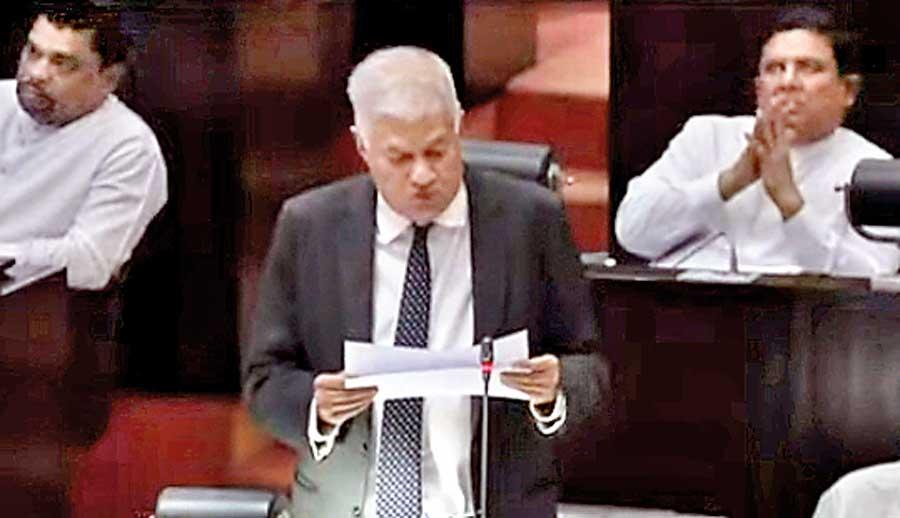Reply To:
Name - Reply Comment
Last Updated : 2024-05-09 16:06:00

President Ranil Wickremesinghe addressing Parliament on Wednesday on the question of devolution of power
To rekindle the devolution-debate fire in a country that has still not come out of the economic bankruptcy may appear to be out of sync. Since devolution of power is linked to political stability, which in turn is linked to economic revival, the topic requires urgent attention with a view to finding a solution that has eluded Sri Lanka for seven long decades.
stability, which in turn is linked to economic revival, the topic requires urgent attention with a view to finding a solution that has eluded Sri Lanka for seven long decades.
On Wednesday, President Ranil Wickremesinghe made a special address to Parliament, calling for a step-by-step process to effect meaningful devolution to Sri Lanka’s nine provinces in terms of the 13th Amendment to the Constitution.
A mini-debate followed his address, highlighting the incendiary nature of the topic. For every president who has taken up the devolution problem with the intention of solving it or resorting to skullduggery to navigate through a path of political and geopolitical landmines, the issue has been like carrying burning embers in his or her hand.
Despite a costly separatist war, very little has changed in the attitude of the proponents and opponents of power devolution since it was first mooted in the late 1940s by minority Tamil leaders who had little trust in the post-independence Sinhala leaders. They were dissatisfied with the 1947 Soulbury Constitution and believed that the Sinhala leaders would not treat the Tamils as equal citizens of this country. Their fears were not without foundation.
When the second State Council was formed in 1936 under the Donoughmore Constitution, the Sinhala members arithmetically manipulated the executive committee system to prevent Tamil members from being elected as heads of any of the seven executive committees and becoming ministers.
Adding to their fears was the 1948 Citizenship Act, which deprived many plantation Tamils of Indian origin of citizenship and voting rights.
The Federal Party headed by S.J.V. Chelvanayakam proposed an extreme solution: maximum power devolution within a federal set-up so that the Tamils of the North and East would enjoy self-rule. As the crisis aggravated with regular ethnic clashes throughout the country, attempts were made to solve what is now known as Sri Lanka’s national question.
First came the 1957 pact between Federal Party leader Chelvanayakam and Prime Minister SWRD Bandaranaike. Bandaranaike had come to office by whipping up Sinhala nationalism, and he had enacted the Sinhala Only Act, his election promise, as soon as he had ensconced himself in office.
Seven years after protests forced Bandaranaike to tear up the agreement, the Dudley Senanayake-Chelvanayakam Pact was signed in 1965. This deal was also not implemented due to protests from ultra-nationalists.
These two agreements dealt with power devolution to regional and district councils, making Tamil an administrative and official language, and development and resettlement issues.
The failure to devolve power eventually led to a 30-year separatist war, which ended in 2009 at the cost of impoverishing and indebting the country.
If today’s leaders and parliamentarians fail to resolve the national question by working out a power-devolution package acceptable to all communities, will the separatist war erupt again, if not in the coming years, in the not-so-distant AI-dominated world?
There is no doubt about the Sri Lankan state’s ability to militarily crush any armed rebellion. But future warfare will be different. Cyberwarfare is fast adopting Artificial Intelligence. In AI warfare, states facing internal or external threats will not be able to defeat the enemy with military firepower. Even a small rebel group, if armed with AI technology, will be able to cause serious harm to the State. The rebels or terrorists, as the case may be, do not need to be present in the theatre of conflict. They can operate from safe havens in foreign countries sympathetic to their cause.
Such a scenario would make Sri Lanka economically far worse off than it is today—a non-entity, a non-state, and a non-power incapable of asserting its sovereignty. Sri Lanka’s national interests would become more vulnerable than they are today to end up as offerings at the altar of any nation that is ready to cast a few million dollars before it and take back chunks of its land at strategic locations. That is all the more reason why a solution is necessary.
But the solution is caught in the crossfire of ideological warfare between two extremist viewpoints, one calling for maximum power devolution under a federal setup and the other, deriving its legitimacy from ultranationalism, often bordering on supremacism, insisting that any devolution will be a stepping stone to separatism. The struggle to strike the golden mean is the task at hand.
Complicating the power-sharing arrangement is geopolitics, with governments being seen to be pushing it due to pressure from India rather than any willingness to redress historical wrongs that have widened the divide between the majority and minority communities in this country.
India’s insistence that Sri Lanka should take forward the process of national reconciliation to meet the aspirations of the Tamil community for equality, justice, peace, and dignity has more to do with geopolitical undercurrents than with any altruistic objective or a humanistic approach to help minorities. The contradiction is that in India itself, minorities are feeling more insecure than ever under Prime Minister Narendra Modi’s Hindutva policies.
However, the fears that were expressed in 1987 when the 13th Amendment was adopted under pressure from India as a solution to the national question and throughout the devolution debate since then still prevail, as was evident in the views expressed in Parliament on Wednesday.
In 1987, the SLFP petitioned the Supreme Court, claiming that devolution of power as envisaged in the 13th Amendment not only endangered the unitary status of the Constitution but would also result in destroying Buddhism and Buddhist institutions in the North and East. “The virtual handing over of these places of historic and religious importance to persons culturally alienated from Buddhism is an abrogation of the duty... to protect and foster the Buddha Sasana,” the petition claimed.
President Gotabaya Rajapaksa, in an interview with The Hindu during a visit to India in the first few weeks of assuming office in 2019, said: “We can discuss political issues, but for 70-odd years, successive leaders have promised one single thing: devolution, devolution, devolution. But ultimately, nothing happened. I also believe that you can’t do anything against the wishes and feelings of the majority community.”
On Wednesday, an opposition Parliamentarian elected from the Sri Lanka Podujana Peramuna, which owed much of its success in the 2019 and 2020 elections to a dangerous form of far-right nationalism, expressed similar sentiments in response to President Wickremesinghe’s call for a parliamentary process to devolve power other than police powers to the provinces.
The national question remains a Gordian knot. This is not solely due to the failure to devolve political and administrative power to the provinces, regions, or districts. Rather, it is because of our leaders’ lack of statesmanship and foresight.
They have failed to make this country a liberal, secular meritocracy where there will be no room for distrust between communities or any complaints of discrimination based on a citizen’s ethnicity, caste, religion, or language. Perhaps the solution also lies in empowering the Sri Lankan identity, enabling it to supersede all other micro-identities.
Sangaralingham Friday, 11 August 2023 03:34 AM
Countryneed social harmony political stability economic upswings not hate,ongoing think 1983 think prolonged conflicts think hate speeches think language laws.all have no place in any cultured society civilized environment.wife crumpling for minor things abusive in house family in shambles think nation similar phenomenon watchlaws customs traditions.needlotof foreign help to revive economy many a brilliant minds running away others expected to follow.foreign lands ot rosy climate change floods droughts hate for foreign elements including humans housing poor employers not intrested .keep our house country in order peace healthyhonesty. Simply follow teachings of Buddha things change for better.
Milk and honey Saturday, 12 August 2023 01:38 AM
Don’t waste precious time. Implement two states in one country, SL will flow with milk and honey.At least the North and East will prosper. Rest will have to follow.
Percy Wijenayake Sunday, 13 August 2023 10:45 AM
Devolution of Power with nine provinces is an excellent proposal and has been successful in European countries. However, are the Sri Lankans politically matured ? Sri Lankans only think of their ethnicity with no respect to another culture, history, language, religion, and subject to be influenced externally. Consequently development of the country suffers.

Add comment
Comments will be edited (grammar, spelling and slang) and authorized at the discretion of Daily Mirror online. The website also has the right not to publish selected comments.
Reply To:
Name - Reply Comment
US authorities are currently reviewing the manifest of every cargo aboard MV
On March 26, a couple arriving from Thailand was arrested with 88 live animal
According to villagers from Naula-Moragolla out of 105 families 80 can afford
Is the situation in Sri Lanka so grim that locals harbour hope that they coul